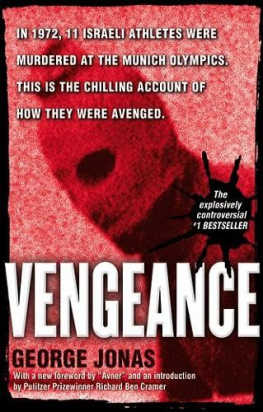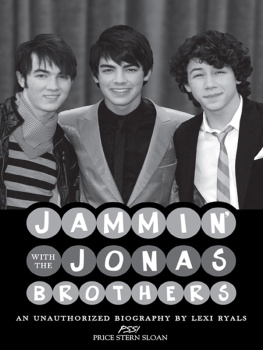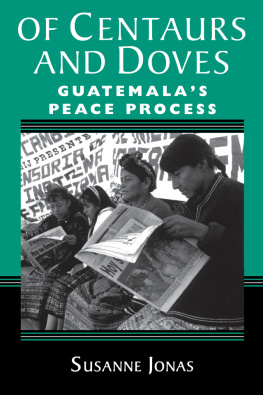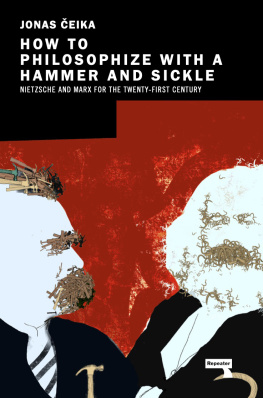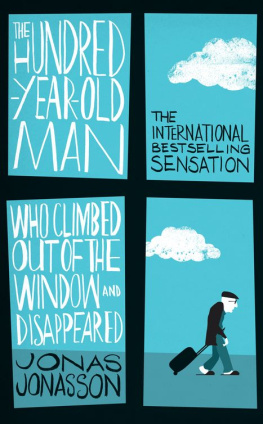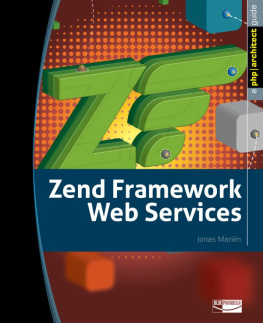George Jonas - Vengeance
Here you can read online George Jonas - Vengeance full text of the book (entire story) in english for free. Download pdf and epub, get meaning, cover and reviews about this ebook. year: 2012, publisher: HarperCollins Publishers, genre: Detective and thriller. Description of the work, (preface) as well as reviews are available. Best literature library LitArk.com created for fans of good reading and offers a wide selection of genres:
Romance novel
Science fiction
Adventure
Detective
Science
History
Home and family
Prose
Art
Politics
Computer
Non-fiction
Religion
Business
Children
Humor
Choose a favorite category and find really read worthwhile books. Enjoy immersion in the world of imagination, feel the emotions of the characters or learn something new for yourself, make an fascinating discovery.
- Book:Vengeance
- Author:
- Publisher:HarperCollins Publishers
- Genre:
- Year:2012
- Rating:5 / 5
- Favourites:Add to favourites
- Your mark:
- 100
- 1
- 2
- 3
- 4
- 5
Vengeance: summary, description and annotation
We offer to read an annotation, description, summary or preface (depends on what the author of the book "Vengeance" wrote himself). If you haven't found the necessary information about the book — write in the comments, we will try to find it.
Vengeance — read online for free the complete book (whole text) full work
Below is the text of the book, divided by pages. System saving the place of the last page read, allows you to conveniently read the book "Vengeance" online for free, without having to search again every time where you left off. Put a bookmark, and you can go to the page where you finished reading at any time.
Font size:
Interval:
Bookmark:
GEORGE JONAS
VENGEANCE

For Barbara Amiel,
and for Assi, David, Kathy, Kopi,
Milt, Tony, Smadar and Yasir,
and for those who died
from the ones who lived.
Philistines have dealt by revenge,
and have taken vengeance with a
despiteful heart, to destroy it for
the old hatred; Therefore thus saith the Lord God;
Behold I will stretch out my hand
upon the Philistines; And they shall know that I am the
Lord, when I shall lay my vengeance
upon them. Ezekiel 25:151617 They wont believe the world they
havent noticed is like that. Graham Greene, Ways of Escape
Contents
I T HAS been a little more than thirty-three years since Palestinian terrorists slipped into the Olympic Village and, in what later became known as the Munich Massacre, killed eleven innocent Israeli athletes competing in the 1972 Games. In the decades since that awful event, I have often reflected on whether Israels responsedispatching me and four others on a mission to Europe to hunt down and kill the eleven individuals who we were told had planned the massacrewas the right one. Unfortunately, like our mission, this is a knotty problem with no easy answers.
So much of what consumes us today in the Middle East is rooted not just in history but in ancient history. In the case of our mission, that history goes back nearly four thousand years, to the Code of Hammurabi, the earliest known expression of what the Romans later called the ex talionis or law of retribution. The Code of Hammurabi doesnt actually use the phrase an eye for an eye (the closest it gets is the rather straightforward prescription If a man put out the eye of another man, his eye shall be put out), but it is imbued with the spirit of what the philosophers call equal retaliationthe idea that the proper way to punish evildoers is to visit on them the very evil theyve done to others.
Moses imposed such a law in Israel, and the phrase an eye for an eye, a tooth for a tooth is repeated three times in the Torah. In a very real sense, this is the flip side of the Golden Rule. Rather than Do unto others as you would have them do unto you, we have If you do it to me, Ill do it right back to you.
In modern times, Israel has embraced, implemented and perfected this principlenot merely for the sake of vengeance, but as a means of survival. An eye for an eye has been Israels guiding strategy in response to terrorism, and an unbroken succession of Israeli governments has endorsed the notion that it is the only sensible response. Indeed, in recent years, under Prime Minister Ariel Sharon, the ex talionis has become a guiding principle and tool of the Israeli army.
Yet is it really a solution? Or should I say, is it really a good solution?
This question has taken on a special urgency since the events of September 11, 2001. Although terrorism had seeped outside of the Middle East prior to 9/11, never before had it involved Americans to the extent it did on that day. And ever since then, the U.S. government has been consumed with avenging 9/11to the point where it has prosecuted wars in Afghanistan and Iraq and rattled its rhetorical sabres at every other nation that refused to join in (or at least endorse) its War on Terrorism.
I am often reminded of my old teams mission as I follow the news about the efforts of the United States and its allies to hunt down Osama bin Laden and his Al Qaeda colleagues. I think about the long hours and dangerous conditions we endured in the name of seeking vengeance for Israel. The world has changed greatly over the past thirty-three years, but the mechanics of revenge remain the same.
And so do its shortcomings. As Gandhi is said to have remarked, An eye for an eye makes the whole world blind. One would be hard-pressed to find a more devastatingor pithiercritique of retributive justice. But what kind of guidance does this critique provide in the face of terrorism? While Gandhis revolutionary pacifism might have made sense when employed against a civilized opponent like the British Empire, how can we possibly consider merely turning the other cheek to adversaries who are willing to commit crimes on the order of the Munich Massacre or 9/11or, for that matter, the Holocaust?
The fact is, our conceptions of morality have little power over terrorists. After all, the terrorists who killed the Israeli athletes in Munich (just like the terrorists who killed the thousands in the World Trade Center) regarded their actions as being profoundly moralholy, even. They viewed themselves as freedom fighters. To them, Israel was the real evildoer, guilty of crimes so heinous and vast as to justify virtually any kind of retaliation.
Does this mean we are to throw up our hands and resign ourselves to an unending cycle of attack and reprisala continuing, escalating bloodbath in which the difference between us and the terrorists will eventually become indistinguishable? Not at all. The fact is that there are real differences between us and the terrorists. When terrorists attack, they shed blood indiscriminately. Indeed, killing innocent people is often the point of what they are doingeither to send a message to those in power or to terrify the population at large. In stark contrast, when Israel exacts revenge for terrorist attackswhether by sending out a team like mine after Munich or by launching an air-to-ground missile in the occupied territories after a car bombingshe aims to do it surgically, targeting only those responsible for the incident that triggered the mission. An eye for an eye, after all, is not a licence for unrestrained barbarism. It means giving back no less than what you received, but no more either.
So it is that if I had to do it all over again, I would make the same choice I made when Golda Meir approached me more than thirty years ago. At the timea time long before the Camp David Accords, a time long before any meaningful peace process, a time when the entire Arab world (including Egypt and Jordan) was calling daily for the destruction of the Jewish state and Israels continued existence was very much an open questionresponding in kind to the violence that had been visited upon us was the only course that made any sense.
But we must be clear about one thing. Though I make no apologies for the mission my team and I carried out in the 1970sand, indeed, am proud that I was able to serve my country in this wayI am under no illusions that we did anything to stop terrorism. As we know all too well, terrorism continues to darken our lives to this dayif anything, on a much grander scale than any of us could have imagined back then.
What will stop it? Not assassination teams or military incursions. In my view, terrorism will continue until the political and economic situation shifts sufficiently to bring equity and balance throughout all of the Middle East. An eye for an eye may seem an appropriate response, but it is not a solution. Unfortunately, until we find one, we must be prepared to deal with continuing terrorist attacks and the subsequent acts of revenge that will inevitably follow.
Avner
May 2005
I N THE FALL of 1981 my publishers asked me if I wanted to meet a man who had an interesting story to tell. After a series of fairly elaborate arrangements, a meeting was set up in a North American city. There, in a small office, I met an individual who gave me his account of a major episode in Israels clandestine war against terrorism: the activities of a counter-terrorist team that was set up following the massacre of Israeli athletes at Munich in 1972.
Even before contacting me, my publishers had satisfied themselves about the mans bona fides. After the meeting I made what inquiries I could on my own, and came to the same conclusion that they had. It was evident to us that we were talking to an Israeli agent who had come in from the coldto our knowledge, the first one.
Next pageFont size:
Interval:
Bookmark:
Similar books «Vengeance»
Look at similar books to Vengeance. We have selected literature similar in name and meaning in the hope of providing readers with more options to find new, interesting, not yet read works.
Discussion, reviews of the book Vengeance and just readers' own opinions. Leave your comments, write what you think about the work, its meaning or the main characters. Specify what exactly you liked and what you didn't like, and why you think so.

